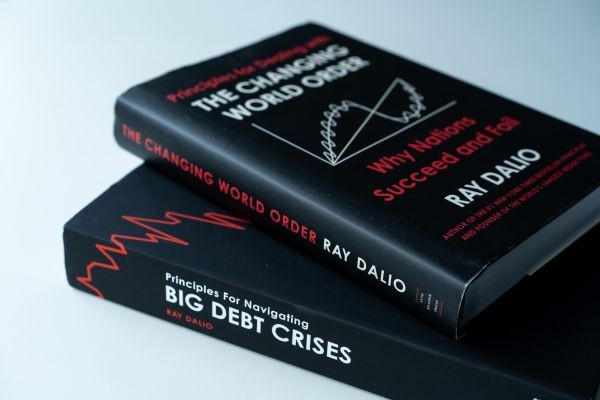Key Themes and Insights:
1. Historical Cycles and the Rise and Fall of Empires
- Pattern of Power Cycles: Dalio identifies recurring cycles in history where nations rise to power, reach their peak, and then decline. These cycles typically last around 250 years and are influenced by economic, political, and military factors.
- Major Empires Analyzed: Dalio focuses on major empires, such as the Dutch, British, and American, to illustrate how they followed similar patterns of ascent and decline.
- Indicators of Decline: Key indicators of a nation's decline include excessive debt, widening income inequality, weakening of leadership, and internal conflict.
2. The Role of Debt and Economic Cycles
- Debt Cycles: Dalio explains that economic cycles are often driven by credit expansion and contraction. Periods of high debt levels are typically followed by economic recessions or depressions.
- Monetary Policy: Central banks play a crucial role in managing debt cycles through monetary policy, but excessive printing of money or low interest rates can lead to inflation, financial bubbles, and eventual collapse.
3. Shifts in Global Leadership
- Emergence of New Powers: Throughout history, rising powers challenge the dominant ones. Dalio discusses China’s ascent as a potential challenger to the United States, mirroring previous transitions in global leadership.
- Geopolitical Implications: Shifts in global leadership often come with geopolitical tensions, trade wars, and military conflicts. Dalio suggests that understanding these dynamics is crucial for navigating the global environment.
4. The Importance of Internal Order
- Strong Governance: Dalio emphasizes that countries with strong institutions, governance, and leadership are more resilient during times of crisis. Societies that maintain order and adapt to change are better equipped to deal with challenges.
- Social Cohesion: Societies with greater social cohesion, where citizens trust their institutions and leaders, tend to fare better during periods of stress. In contrast, high levels of internal conflict often signal the beginning of decline.
5. Principles for Navigating Change
- Adaptability: Dalio stresses the importance of being adaptable in a rapidly changing world. Individuals, businesses, and governments must be prepared to adjust to new realities, whether they involve technological advancements, shifting economic conditions, or changes in global leadership.
- Diversification: To mitigate risk, Dalio advocates for diversification in investments and strategies. As uncertainties grow, spreading risk across different assets, industries, and geographies becomes essential.
- Historical Awareness: Dalio emphasizes the value of studying history to better understand the present and anticipate future trends. He argues that while no two periods are exactly the same, they often rhyme, offering valuable lessons.
6. The Role of Technology and Innovation
- Technological Progress: Innovation is a key driver of a nation's rise to prominence. Dalio points out how technological advancements, from the Industrial Revolution to the digital age, have played a critical role in shaping economic power.
- Disruptive Technologies: As technology continues to evolve rapidly, nations and businesses that can harness its potential will likely maintain or improve their competitive edge.
7. Preparing for the Future
- Global Order Realignment: As the world enters a new phase of economic and political realignment, Dalio provides principles to help readers prepare for the potential turbulence ahead.
- Long-Term Perspective: Dalio encourages individuals and businesses to adopt a long-term perspective, understanding that while short-term challenges are inevitable, history provides valuable insights for weathering such storms.
Conclusion
Ray Dalio’s "Principles for Dealing with the Changing World Order" offers a deep understanding of historical cycles and provides practical strategies for navigating uncertain times. By analyzing the patterns of the rise and fall of empires, the dynamics of debt and economic cycles, and the role of leadership and governance, Dalio equips readers with the tools they need to succeed in a rapidly changing global landscape. Whether you are a policymaker, investor, or individual, the lessons from history presented in this book are essential for navigating the future.

































NataliaMau
12 months ago